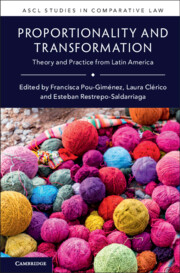Book contents
- Proportionality and Transformation
- Ascl Studies in Comparative Law
- Proportionality and Transformation
- Copyright page
- Contents
- Editors
- Contributors
- Acknowledgments
- Introduction
- Part I Proportionality and Processes of Constitutionalization
- 1 The Standard Reasonableness Test and Proportionality in Argentina
- 2 Proportionality in the Case Law of the Constitutional Court of Ecuador
- 3 Proportionality and Human Rights in Mexico
- 4 Proportionality and the Construction of Democracy
- 5 Proportionality in the Case Law of the Chilean Constitutional Court
- Part II Proportionality in Social Rights and Equality-Based Adjudication
- Part III Proportionality, between Transformation and the Status Quo
- Index
2 - Proportionality in the Case Law of the Constitutional Court of Ecuador
from Part I - Proportionality and Processes of Constitutionalization
Published online by Cambridge University Press: 27 October 2022
- Proportionality and Transformation
- Ascl Studies in Comparative Law
- Proportionality and Transformation
- Copyright page
- Contents
- Editors
- Contributors
- Acknowledgments
- Introduction
- Part I Proportionality and Processes of Constitutionalization
- 1 The Standard Reasonableness Test and Proportionality in Argentina
- 2 Proportionality in the Case Law of the Constitutional Court of Ecuador
- 3 Proportionality and Human Rights in Mexico
- 4 Proportionality and the Construction of Democracy
- 5 Proportionality in the Case Law of the Chilean Constitutional Court
- Part II Proportionality in Social Rights and Equality-Based Adjudication
- Part III Proportionality, between Transformation and the Status Quo
- Index
Summary
This chapter describes the application of the principle of proportionality in the case law of the Constitutional Court of Ecuador in a context that is highly favorable to its use, given the presence in the Constitution of 2008 of an amplified rights catalog, the reception of international human rights instruments into the constitutional block, and the explicit authority granted to the Court to resort to proportionality analysis to solve tensions and conflicts between rights. On the basis of decisions produced between 2008 and 2019, the authors show that the Constitutional Court has applied the method with different goals in mind and with regards an ample variety of subject matters covering civil and political rights but also economic, social, cultural and environmental rights. While the authors point out that the method has received inadequate uses, case law analysis also shows that it has been used to protect traditionally discriminated–against social groups, displaying a transformative potential.
Keywords
- Type
- Chapter
- Information
- Proportionality and TransformationTheory and Practice from Latin America, pp. 41 - 62Publisher: Cambridge University PressPrint publication year: 2022

